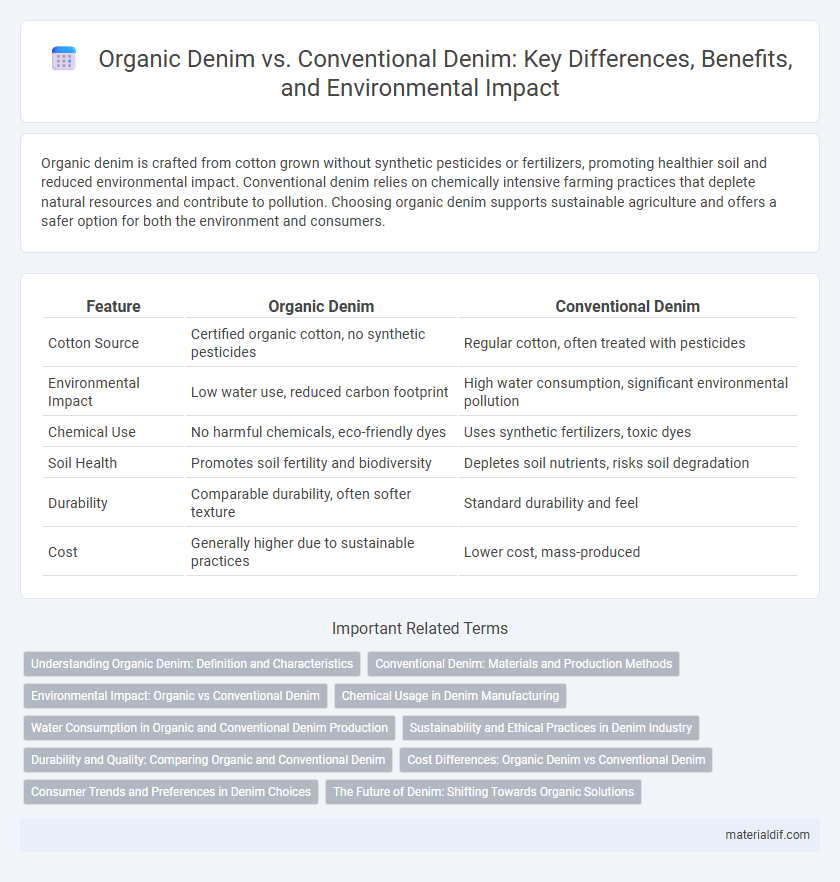Organic denim is crafted from cotton grown without synthetic pesticides or fertilizers, promoting healthier soil and reduced environmental impact. Conventional denim relies on chemically intensive farming practices that deplete natural resources and contribute to pollution. Choosing organic denim supports sustainable agriculture and offers a safer option for both the environment and consumers.
Table of Comparison
| Feature | Organic Denim | Conventional Denim |
|---|---|---|
| Cotton Source | Certified organic cotton, no synthetic pesticides | Regular cotton, often treated with pesticides |
| Environmental Impact | Low water use, reduced carbon footprint | High water consumption, significant environmental pollution |
| Chemical Use | No harmful chemicals, eco-friendly dyes | Uses synthetic fertilizers, toxic dyes |
| Soil Health | Promotes soil fertility and biodiversity | Depletes soil nutrients, risks soil degradation |
| Durability | Comparable durability, often softer texture | Standard durability and feel |
| Cost | Generally higher due to sustainable practices | Lower cost, mass-produced |
Understanding Organic Denim: Definition and Characteristics
Organic denim is made from cotton grown without synthetic pesticides, fertilizers, or genetically modified organisms, ensuring a more sustainable and eco-friendly textile. This type of denim typically involves water-saving cultivation practices and chemical-free dyeing processes, resulting in reduced environmental impact compared to conventional denim. Organic denim fabrics often offer comparable durability and comfort while promoting healthier soil and biodiversity preservation.
Conventional Denim: Materials and Production Methods
Conventional denim is primarily made from non-organic cotton grown with synthetic pesticides and fertilizers, contributing to significant environmental pollution. The production process often involves water-intensive dyeing techniques and chemical treatments like synthetic indigo dyes and resin finishes that can release harmful substances. Mass manufacturing of conventional denim relies heavily on fossil fuels and generates higher carbon emissions compared to organic denim alternatives.
Environmental Impact: Organic vs Conventional Denim
Organic denim production significantly reduces environmental impact by utilizing non-GMO cotton grown without synthetic pesticides or fertilizers, which preserves soil health and biodiversity. Conventional denim relies heavily on intensive water usage, chemical pesticides, and synthetic fertilizers, contributing to water pollution and soil degradation. Organic denim also lowers carbon emissions through sustainable farming practices, making it a more eco-friendly alternative to conventional denim.
Chemical Usage in Denim Manufacturing
Organic denim uses cotton cultivated without synthetic pesticides or fertilizers, significantly reducing the chemical footprint compared to conventional denim. Conventional denim production involves heavy use of toxic dyes, synthetic fertilizers, and pesticides, which contribute to soil degradation and water pollution. The elimination of harmful chemicals in organic denim manufacturing promotes a safer environment and lessens health risks for farmers and factory workers.
Water Consumption in Organic and Conventional Denim Production
Organic denim production significantly reduces water consumption, using up to 90% less water compared to conventional denim manufacturing processes. Conventional denim typically requires about 7,000 to 10,000 liters of water per pair, primarily for cotton irrigation and dyeing. The water efficiency in organic denim stems from sustainable farming practices and eco-friendly dyeing techniques that minimize water waste and pollution.
Sustainability and Ethical Practices in Denim Industry
Organic denim is produced from cotton grown without synthetic pesticides or fertilizers, significantly reducing environmental pollution and water consumption compared to conventional denim. Conventional denim relies heavily on chemical-intensive farming and toxic dyes, leading to soil degradation and harmful runoff that jeopardize ecosystems. Ethical practices in organic denim include fair labor conditions and reduced carbon footprint, promoting a more sustainable and socially responsible fashion industry.
Durability and Quality: Comparing Organic and Conventional Denim
Organic denim is crafted from cotton grown without synthetic pesticides or fertilizers, resulting in fibers that are often longer and stronger, enhancing the fabric's durability and overall quality. Conventional denim uses chemically treated cotton, which can weaken the fibers and reduce fabric lifespan. The sustainable farming practices in organic cotton production contribute to denim that maintains its shape and color longer, offering superior wear resistance compared to conventional denim.
Cost Differences: Organic Denim vs Conventional Denim
Organic denim typically incurs higher production costs due to sustainable farming practices and eco-friendly dyeing processes, resulting in retail prices that are 20-40% higher than conventional denim. Conventional denim benefits from large-scale, chemically intensive manufacturing methods that reduce expenses, making it more affordable for consumers. Despite the cost difference, organic denim appeals to environmentally conscious buyers seeking reduced pesticide use, water conservation, and lower carbon footprints.
Consumer Trends and Preferences in Denim Choices
Consumers increasingly favor organic denim due to its sustainable production methods, reduced chemical usage, and lower environmental impact compared to conventional denim. Market data indicates a significant rise in demand for eco-friendly denim, driven by growing awareness of ethical fashion and health concerns related to toxic dyes and pesticides in conventional fabrics. Brands integrating organic cotton and water-saving techniques in denim production are capturing a larger share of environmentally conscious shoppers.
The Future of Denim: Shifting Towards Organic Solutions
The future of denim increasingly embraces organic cotton, reducing environmental impact through lower water usage and chemical-free farming compared to conventional denim production. Organic denim supports sustainable agriculture, enhancing soil health and biodiversity while meeting growing consumer demand for eco-friendly fashion. This shift signals a transformative approach within the textile industry towards more responsible and regenerative materials.
Organic Denim vs Conventional Denim Infographic

 materialdif.com
materialdif.com